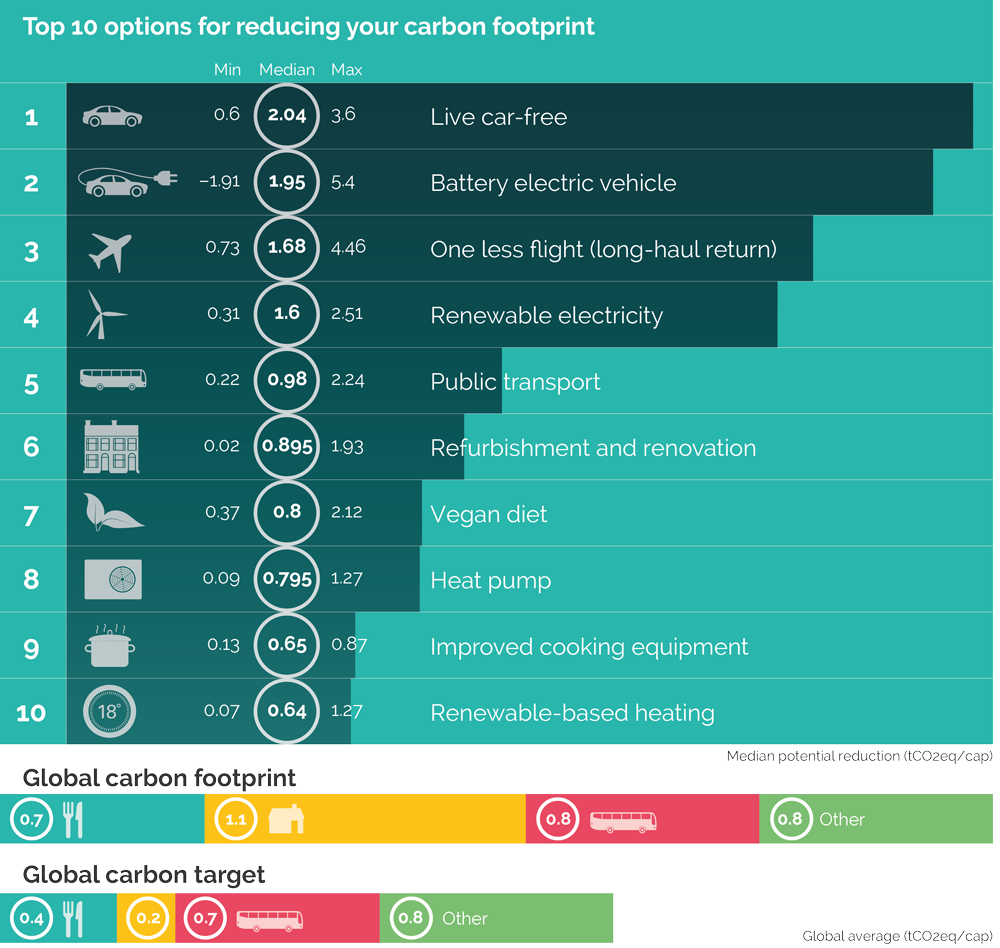Diana Ivanova, Clare Downing and Aimee Eeles
The climate emergency and net-zero targets for 2050 have raised awareness of the urgent need for action and has given the public a thirst for ideas for the most effective actions they can take. The fact that COP26 is being hosted by the UK in 2021 may also push the Government to look at the systematic and transformational changes in energy demand that will be required to achieve the net-zero targets.
Internationally leading research will be needed to provide the evidence to support these changes. CREDS researchers at the University of Leeds are part of a team of international researchers who have screened nearly 7,000 studies from across the globe to develop a list of the most-effective changes to household consumption to cut our carbon footprint. The evidence supports changes in consumption practices, policies and infrastructure. The study is a systematic meta-review entitled Quantifying the potential for climate change mitigation of consumption options, and was published in the journal of Environmental Research Letters (ERL). The paper was the third most downloaded article published in 2020.
The top ten list of options was created to explain how to reduce your carbon footprint with the accompanying graphic.

There was extensive international interest in the report and media coverage, including BBC Online and the BBC Radio 4 Today programme. Nature NewsOpens in a new tab featured the report after it was published in the journal Environmental Research Letters (ERL).
Roger Harrabin, an Energy and Environment Analyst at the BBC, released an exclusive articleOpens in a new tab citing the findings following an interview with lead author Diana Ivanova. The Harrabin article led on the BBC Science main page throughout the day and reached half a million hits within the first week of being published.
CREDS Core Team promoted the findings and related BBC article through the CREDS website and Twitter. These posts triggered a lot of discussion and have attracted more than 50,000 impressions and 4,700 engagements. Diana’s Twitter post about the publication reached 22,600 impressions and 2,850 engagements. On the CREDS website, the blog post received 3, 337 page views with an average time on page of over 5 minutes (indicating users were reading the post in full).
Since the publication, Diana has been interviewed for several local and national media outlets such as, Science NewsOpens in a new tab, CIEHOpens in a new tab, and received radio interview requests from Flirt FM in Ireland and Radio Aire. Articles were also published in the German news magazine Der Spiegel (paper edition), The IndependentOpens in a new tab and other smaller outlets in various countries including Germany and Austria. Results were also reflected in popular online quizzes published by the BBCOpens in a new tab in October 2021 and by the New York TimesOpens in a new tab in December 2022.
The impact of this work is already significant since the meta-review is strongly featured in the text and figures of a UNEP Emissions Gap 2020 report, Chapter 6 Bridging the gap – the role of equitable low-carbon lifestyles. The review also strongly influenced the framing of the IPCC Sixth Assessment Report (AR6) 2022, which included a synthesis section on demand-side mitigation options derived from the research and a dedicated figure in the full report (Figure 5.8). The article had been cited over 320 times by October 2023 (Google Scholar).
Future plans
The meta-review already features in several important research effortsOpens in a new tab, which will hopefully produce a longer-term impact. The lead author regularly receives request about additional country- and option-specific findings. The authors continue to engage in communication activities with policy-makers and the general public.
Some of the outcomes were less desirable, such as occasional harassment by email and Twitter from readers who thought that limiting population should have been more extensively covered in the systematic review. As a result of this and other incidences CREDS will be having a spotlight on Equality, Diversity and Inclusion (EDI), including dealing with online harassment to coincide with the national anti-bullying week in November.
Sources of information
- Blog: Challenging consumption to cut carbon footprints
- Blog: 60 consumption options to fight global warmingOpens in a new tab, available in English and French
- Journal article: Quantifying the potential for climate change mitigation of consumption optionsOpens in a new tab
- UNEP: Emissions Gap 2020 report, Chapter 6 Bridging the gap – the role of equitable low-carbon lifestyles, pdfOpens in a new tab (14 pages, 1.1 MB)
Quote
We need a complete change of mindset. We have to agree how much carbon we can each emit within the limits of what the planet can bear – then make good lives within those boundaries. The top 10 options are available to us now, without the need for controversial and expensive new technologies.” Dr Diana Ivanova from the University of Leeds, as said to BBC News.
Publication details
Ivanova, D., Downing, C. and Eeles, A.K. 2020. Top ten tips for reducing your carbon footprint attracts international attention. Centre for Research into Energy Demand Solutions. Oxford, UK. CREDS case study.
Banner photo credit: Alireza Attari on Unsplash
